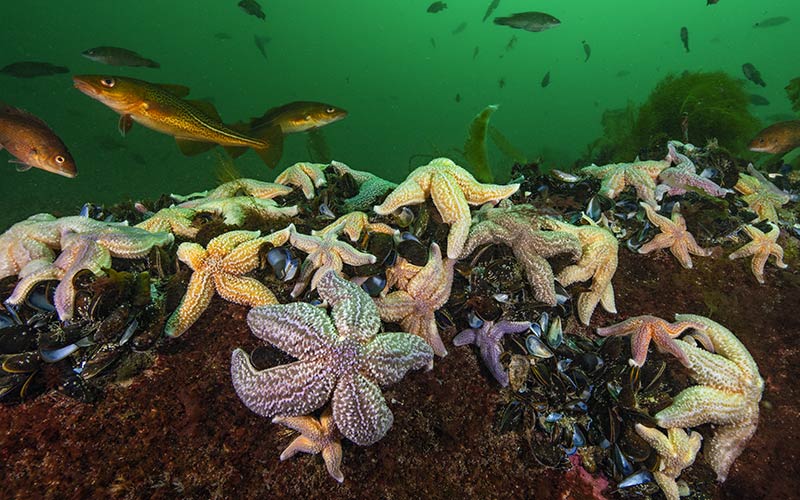
Brian Skerry took this photo of sea stars and fish while diving on Cashes Ledge.
When it comes to exploring the wonders of ocean life around the globe, marine photojournalist Brian Skerry is a pioneer. He’s spent more than 10,000 hours underwater, filming whales learning to hunt, documenting long-lost shipwrecks, and contributing to National Geographic Magazine for more than 25 years – but he’s always returned to the Gulf of Maine, the place where he grew up and dove for the first time.
Skerry recently produced “Sea Change,” a PBS NOVA series highlighting the beauty and challenges facing the Gulf of Maine. The series includes a special focus on Cashes Ledge, an almost untouched underwater mountain range that provides a rich habitat for vibrant sea life. We recently caught up with Skerry to learn more about his work.
This interview has been edited for brevity and clarity, and all photos were taken by Brian Skerry.
You’ve been exploring the Gulf of Maine and Cashes Ledge with CLF for 10 years. How have things changed?
I began diving the Gulf of Maine about 45 years ago and Cashes Ledge a little over a decade ago, and I’ve been blown away by how much change is occurring in more recent years. One of the best quotes that I can think of came from a kelp scientist that I’m working with, Dr. Doug Rasher at Bigelow Labs. We came up from a dive at what was originally supposed to be his best dive site for kelp forest, and he said, “We’re seeing change in the life of a grant,” which for him is about two years. He’s seen a healthy kelp forest decline quite rapidly within about two years, in many cases. It’s happening rapidly and it’s happening regularly.

When you started exploring the Gulf of Maine, what surprised you the most?
I think what surprised me the most when I began diving in the Gulf of Maine was just how much abundance, diversity, and color there was. People think of tropical places as being the most colorful places in the ocean. But the truth is, because of all the nutrients [in the Gulf of Maine] there is this explosion of life and of color.
I think that’s one of the great surprises for me. One of the things that I focused on as a photographer and visual storyteller is showing people that may have lived here their entire life just how beautiful this place is.
What are your biggest fears for the future of New England’s waters?
If you had told me back in the late 1970s or early 1980s the amount of change that I would see in just a few decades, what I would describe as almost geologic change, I never would have believed it. I see ecosystems that used to be once thriving that are now collapsed and devoid of life.
I guess my biggest fear is all of this ends up disappearing with a whimper, without anybody really knowing what once existed and how much we have lost in such a short amount of time. It’s not too late. There is a way to save this. There are solutions. But the window of opportunity is closing rapidly, and I believe we have to act immediately to save all that remains.
Can you describe what makes Cashes Ledge special?
It has the largest kelp forest off the Atlantic Coast. That’s a very unique distinction. And it is a habitat for so many animals. For me, it’s like going back in time when I go out there. I see codfish, I see healthy kelp communities, I see a sky filled with pollock and herring and all these other animals. So, it’s uniquely special.
It reminds me of places that I used to see decades ago but have sadly disappeared because of [human-caused] changes. And I think that if everybody could appreciate just how unique Cashes Ledge is and how it’s directly tied to your life, it would be a no-brainer that we need to protect this place.

What do you want people to know about New England’s waters?
I guess what I’d like people to know about New England’s oceans are that they are a very special place and that they’re filled with stories, they’re filled with personalities. Even if you never put on a mask and snorkel, and never put your face in the water, and maybe don’t even live along New England’s coast, it doesn’t matter. This is part of your legacy. It’s part of your heritage. It’s giving you oxygen to breathe.
The ocean is the greatest carbon sink on our planet, so protecting all of the ocean is important to your very health, your children’s future. But I think there’s great surprises in New England’s waters and whether you physically go under, or just look at photos or documentaries about it, you can learn so much and feel proud that this place is maybe in your backyard if you live in New England, and that you are directly connected to it no matter where you live.
Watch Brian talk about Cashes Ledge below.




